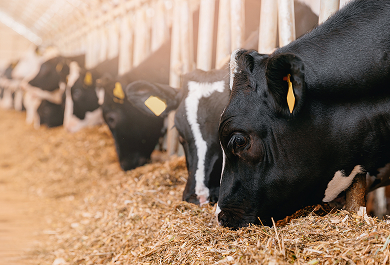

How Customized Probiotics Are Reshaping Dairy Production
In an industry where efficiency and animal health directly impact the bottom line, dairy producers are increasingly turning to innovative solutions that go beyond traditional approaches. One such advancement is CERTILLUS, Arm & Hammer Animal Nutrition’s customized probiotic solution, which is proving to be valuable not just for addressing gut health challenges but for enhancing overall production efficiency.
Understanding the Hidden Challenges
While acute gut health issues like Hemorrhagic Bowel Syndrome (HBS) are well-recognized in the dairy industry, the less visible subclinical challenges often go unaddressed, according to Jesse Thompson, Sr. Product Manager for Microbial Solutions at Arm & Hammer Animal Nutrition.
“The less-understood challenge is more subclinical,” Thompson explains. “There are stacked stressors, maybe moderate levels of pathogens that aren't necessarily killing the animal, but that the immune system is diverted toward fighting pathogenic challenges and ultimately dragging on production.”
These subclinical challenges can significantly impact milk production without showing obvious symptoms, making them difficult to identify without proper testing and analysis.
The Microbial Customization Process
What sets CERTILLUS apart is its customized approach based on extensive sampling and analysis.
“We're customizing probiotics on a regional basis across the U.S. It’s not a one-size-fits-all solution,” Thompson notes. “We understand that different probiotic strains do different things. This allows us to target our solutions specific to challenges in each region.”
For dairy operations, the process involves collecting fecal samples, fermented feeds, commodity feeds, and most important, the Total Mixed Ration (TMR) to develop custom formulations. This approach is backed by research showing that pathogen diversity varies significantly by geographical location.
“We regularly collect samples from dairy farms,” Thompson explains. “We validate that regional approach and routinely update what our formulations are. It's not a static product. We're continuously assessing and trying to understand what's most effective.”
Beyond just providing a probiotic solution, the Arm & Hammer team offers valuable insights to producers. “Our sales team goes through a feed hygiene audit as a value-added service,” says Thompson. “We can show you something that you can’t necessarily see.”
Three Pillars of Effective Probiotics
According to Thompson, CERTILLUS is built on three key pillars:
- Customization to inhibit specific regional pathogens: As compared to other probiotic products on the market, we customize our probiotics to inhibit pathogens in different geographical regions.
- Improved gut integrity: Not only are we inhibiting pathogens, but we're improving gut integrity within the host. This tightened gut barrier function translates to tangible benefits including improved feed conversion efficiency, reduced treatment costs and more consistent weight gain.
- Promoting a healthy rumen microbiome: We're shifting the rumen microbiome to increase the fiber-degrading bacteria to improve rumen efficiency.
Benefits Beyond Disease Prevention
While many dairy producers view probiotics as a solution for acute health challenges, their benefits extend far beyond that.
“Even in the presence of a low pathogenic challenge, we see benefits relative to rumen efficiencies,” Thompson shares, referencing research conducted at Oklahoma State University. “There are many benefits to probiotics on enhanced performance and optimal health beyond pathogenic challenges.”
This represents a shift in thinking about probiotics – from therapeutic interventions to preventative solutions that enhance overall production efficiency.
Many dairy producers have traditionally viewed probiotics primarily as a therapeutic intervention. In typical scenarios, operations might administer probiotics only when health monitoring systems indicate potential issues.
When presented with the concept of a prophylactic approach – regularly including probiotics in feed rations as a preventative measure – producers often question the return on investment, particularly when their herds aren’t experiencing obvious health challenges. However, research data from institutions like Oklahoma State University has proven valuable in changing this perspective. Studies demonstrating improved feed efficiency in herds with no apparent pathogenic challenges help illustrate that probiotics offer benefits beyond just addressing health issues. For many producers, understanding these broader performance advantages represents a significant shift in thinking about probiotic supplementation on dairy operations.
Practical Implementation
For optimal results, Thompson recommends starting with CERTILLUS Calf in young animals, then transitioning to CERTILLUS Dairy as heifers mature and continue throughout lactation. Producers should consult their nutritionists to help determine the proper protocol for their operation.
Not All Probiotics Are Created Equal
Thompson emphasizes the importance of scientific validation in probiotic solutions. “The effectiveness of probiotics depends greatly on the research behind them,” he explains. “Some products in the marketplace haven’t undergone the same level of scientific scrutiny or testing that we believe is essential.”
This highlights why Arm & Hammer Animal Nutrition invests significantly in research and development, ensuring that CERTILLUS formulations are based on extensive laboratory testing and field validation rather than assumptions about what might work in diverse production environments.
With a database of over 82,000 probiotic strains, Arm & Hammer continuously evaluates which specific Bacillus strains will be most effective for particular challenges.
“Some probiotics in the industry have been using the same single strain of Bacillus since the 90s,” Thompson points out. “As challenges change, we want to make sure that we're modifying our products and offerings to keep up with those challenges.”
A Solution That Evolves
Perhaps most important, CERTILLUS isn't a static product; it evolves as challenges change.
“We’re continuously evolving our products, and as challenges within the industry and pathogens shift, so do our solutions,” Thompson emphasizes. “We’re routinely updating our regional formulations because we know in this world where microbes are constantly evolving and changing, you have to keep up with the times.”
Looking Forward
As the dairy industry continues to face challenges from various fronts, solutions that enhance resilience and efficiency without adding management complexity will become increasingly valuable.
“The future of probiotics in dairy is about more than just addressing health challenges,” Thompson concludes. “It's about creating a more productive dairy cow overall by supporting gut health proactively. When producers understand this broader perspective, they can develop more resilient herds that perform consistently throughout the natural cycles of challenges that occur on every operation.”
For dairy producers and nutritionists looking to enhance their operations, advanced probiotics like CERTILLUS offer a science-backed pathway to optimized performance. As the industry evolves, this proactive approach to animal health and performance will become an increasingly important component of successful dairy management.
Reach out to your Arm & Hammer Animal Nutrition representative for more information.
References:
Thompson, J. (2022, June 22). Regional Survey of Dairy Clostridium Populations Across the United States [Presentation]. American Dairy Science Association Annual Meeting, Abstract 2040M. Arm & Hammer Animal Nutrition, Church & Dwight, Inc.
Thompson, J.S., Rehberger, J.M., de Jesus, M.N., Bretl, V.G., Paszkiewicz, S.R., Mazza, F.R., Wardecke, L.J., Smith, A.H., & Rehberger, T.G. (2022). Regional Survey of Clostridium Populations Across the United States. Abstract presented at the American Dairy Science Association Annual Meeting 2022.
Maylem, E.R.S., Vargiu, M., Melton, C., Stiger, C., Thompson, J.S., O'Neill, J., Rehberger, T.G., Rehberger, J.M., Smith, A.H., Foote, A.P., & Spicer, L.J. (2024). Effect of a Bacillus subtilis-based direct-fed microbial, on milk yield, milk components, feed intake and plasma hormones and metabolites in lactating Holstein cows. Animal Feed Science and Technology, 318, 116136. https://doi.org/10.1016/j.anifeedsci.2024.116136
Mazza, F.R., Thompson, J.S., Saylor, B.A., & Smith, A.H. (2024). Survey of Bacterial Populations in Various Feed Types from Farms Across the U.S. Abstract presented at the American Dairy Science Association Annual Meeting 2024.
Mazza, F.R., Thompson, J.S., Saylor, B.A., & Smith, A.H. (2024). Survey of Bacterial Populations in Various Feed Types from Farms Across the U.S. Poster #2560 presented at the American Dairy Science Association Annual Meeting 2024, Arm & Hammer Animal and Food Production, ScienceHearted Center, Waukesha, WI.

